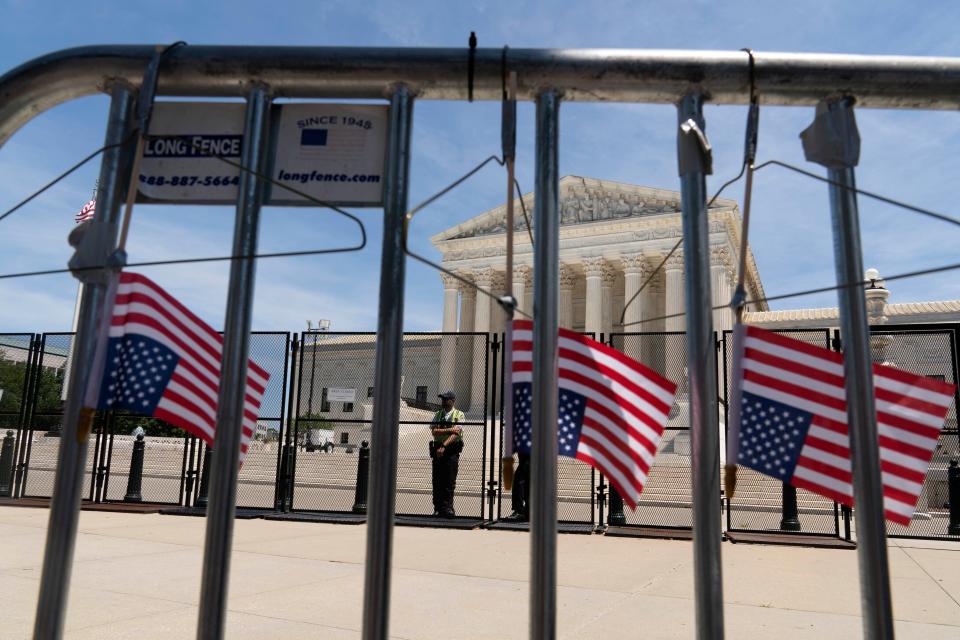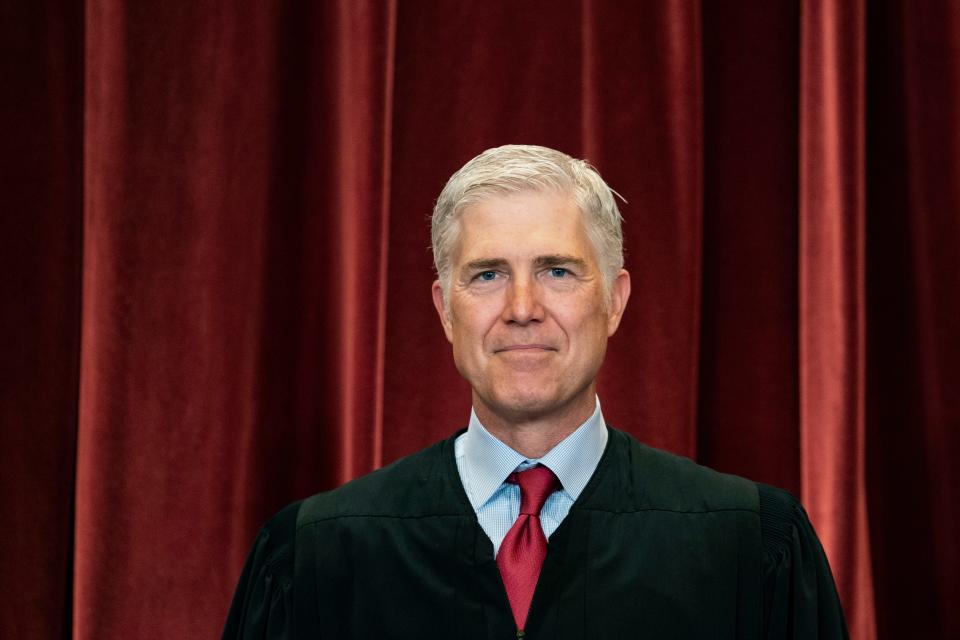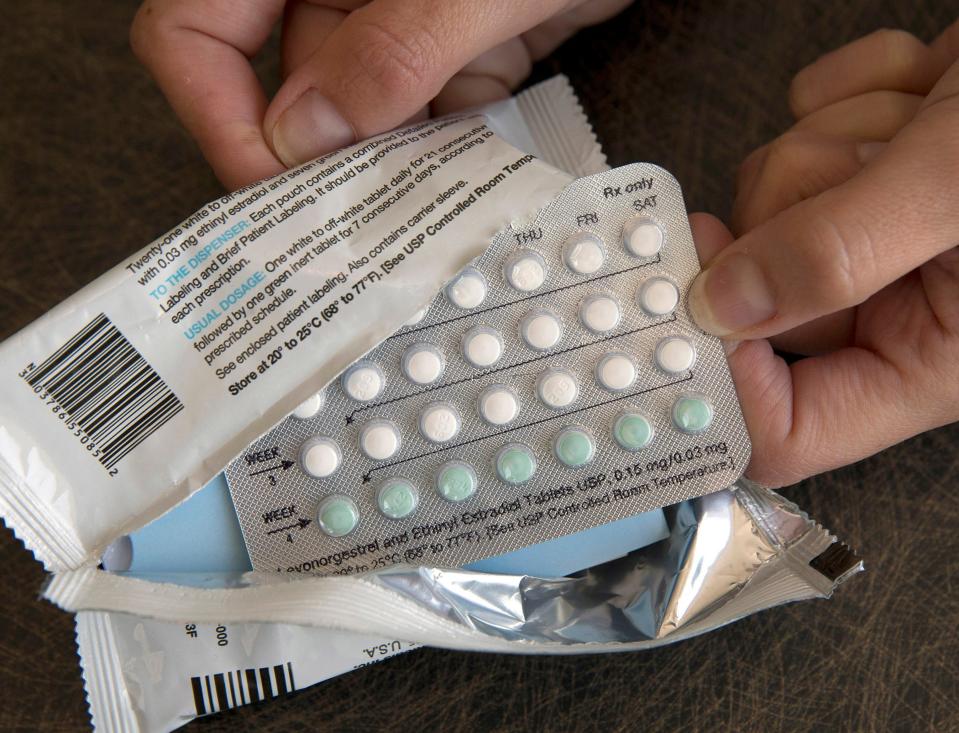Contraception and the Supreme Court: Why CVS, Walgreens allow pharmacists to deny birth control
WASHINGTON – The nation's largest drugstore chains have come under scrutiny in recent weeks for policies that allow pharmacists to refuse to dispense birth control if doing so conflicts with their religious or moral beliefs.
For the most part, experts say, the law is on their side.
Title VII of the Civil Rights Act of 1964 requires companies to accommodate workers' religious beliefs as long as the request doesn't create an "undue hardship" on an employer. Just how far employers must go is open to debate – but the Supreme Court has repeatedly signaled an interest in expanding religious rights, not limiting them.
CVS Pharmacy told USA TODAY last week that it has a policy similar to one adopted by competitor Walgreens, allowing pharmacists to refuse prescriptions for birth control or decline to sell condoms. Those policies have sparked outrage on the left and a flurry of viral social media posts. But the companies, experts say, appear to be doing what the law requires.
The companies have stressed that if a pharmacist has a religious or moral objection to contraception, the prescription or sale would be handled by another pharmacist.
Policy: CVS Pharmacy, Walgreens allow pharmacists to deny birth control prescriptions
Explainer: What to do if a pharmacist refuses to fill your birth control prescription
"Can the individual pharmacist decline? The answer is yes. Under Title VII and under the caselaw as developed by the Supreme Court and the lower courts, there is an obligation by the employer to provide a reasonable accommodation" for bona fide religious belief, said Merrick Rossein, a professor at City University of New York School of Law.
The situation, Rossein said, might get more dicey in rural areas where it could be harder to find another pharmacist. And there's a fair amount of wiggle room in what "reasonable accommodation" means. But Rossein and other experts say it's more likely a question of when – not if – the Supreme Court will move the law further in favor of religious freedom and religious accommodation.
Sonia Suter, a professor at George Washington University Law School, said that whether a pharmacist who refuses to fill a prescription must then refer a customer to another pharmacist varies by state.
"I wouldn’t be surprised if we started to see more states prohibiting or permitting (prescription) refusals, so it's really a question of what your law allows because there is so much variety there," Suter said.
What's the issue? Some of the nation's largest drugstore chains have policies in place that allow pharmacists to decline to sell items that conflict with their beliefs, including contraception.
What's the law? Federal and some state laws require companies to make accommodations for religious beliefs. The Supreme Court ruled in 1977 that such accommodations can be very minimal, though experts predict that may change.
What's the big picture? After the Supreme Court's decision to overturn Roe v. Wade and end the constitutional right to abortion it established in that 1973 case, there has been considerable angst over whether contraception will be next. The court's majority said the abortion ruling wouldn't affect contraception or same-sex marriage.
What does it mean for patients?
Cynthia Harper, a professor of obstetrics gynecology and reproductive sciences at the University of California, San Francisco, said that the stakes are high for patients seeking contraception. Harper said that large companies such as CVS and Walgreens have been better than smaller, independent pharmacies about setting reasonable policies surrounding contraceptive access.
"It's an issue that’s been very contentious," said Harper, who leads the Beyond the Pill program at UCSF's Bixby Center that promotes access to contraception. "There have been lawsuits about people's beliefs about contraception and they’re not science-based. They’re just beliefs that people hold and I anticipate that there’ll be a lot more legal action in this area."
What has the Supreme Court said?
In the 1977 decision in Trans World Airlines v. Hardison, the Supreme Court noted that the law requires employers to accommodate workers' religious requests as long as those accommodations don't create an "undue hardship." The court defined undue hardship as anything having more than a "de minimis," or trivial cost.
That's a low standard and it means employers could avoid making accommodations in many situations, such as denying an employee's request to take off the sabbath if someone else can’t cover the shift. Critics say the court developed the de minimis threshold more or less from thin air. And several of the court's conservative justices have said in recent dissents that they are prepared to revisit it.

"I have no doubt that they're going to take this issue the next real time it presents itself," said Michael Foreman, director of the Civil Rights Appellate Clinic at Penn State Law.
The pharmacy companies probably recognize that and, Foreman speculated, while they might be able to "get by on the de minimis standard" the smart legal strategy is instead going to be to "put their best foot forward."
What does Title VII say about religion?
The federal statute prohibits an employer from refusing to hire "or to discharge any individual, or otherwise to discriminate against any individual with respect to his compensation, terms, conditions, or privileges of employment because of such individual's race, color, religion, sex, or national origin." The law requires employers to make reasonable accommodations for "religious observance and practice" as long as that can be accomplished without "undue hardship" on the employer's business.
What have Supreme Court justices said about religious accommodation?
Associate Justices Neil Gorsuch and Samuel Alito have been the most vocal in opposing the court’s current standard.
The Supreme Court last year declined to hear a lawsuit filed by a Jehovah’s Witness who wanted to ensure his work schedule at Memphis Light, Gas and Water wouldn't conflict with his desire to attend religious services. The court didn't explain why it declined to take the case but Gorsuch and Alito provided a stinging dissent.
"There is no barrier to our review and no one else to blame," Gorsuch wrote in an opinion joined by Alito. "The only mistake here is of the court’s own making – and it is past time for the court to correct it."
Overall, the high court's 6-3 conservative majority gave religious exercise supporters a clean sweep in the term that ended in June. It sided with a former high school football coach who lost his job after offering prayers at the 50-yard line after games, struck down a state prohibition in Maine on using public money to attend schools that offer religious instruction and ruled that the city of Boston could not deny a Christian group the ability to raise a flag at City Hall alongside secular organizations.

What have the pharmacy companies said?
Amy Thibault, CVS spokeswoman, told USA TODAY that "under federal law, we must reasonably accommodate a religious conviction, and in certain states, a moral or ethical conviction, that may prevent a pharmacist or pharmacy technician from dispensing specific medications." Thibault said an objecting pharmacist must request an accommodation from CVS ahead of time and make arrangements to ensure patient care, either from a different pharmacist or elsewhere.
Fraser Engerman, a spokesman for Walgreens, said that pharmacists are permitted to walk away from fulfilling a prescription or a sale if it conflicts with their beliefs. Engerman said Walgreens' policies are similar to other retailers since pharmacies have to follow the same state and federal laws when it comes to respecting employees' beliefs.
"Our team members are required to sell all products in our stores, unless in the rare instances that the law mandates that a further accommodation be made," Engerman said in an email. "Even then, the employee must apply for a specific exemption, which is reviewed and approved by management through a formal process based on our policies set by law, and is never solely at the discretion of the team member."
Letter: Durbin, Duckworth ask Walgreens CEO to revisit pharmacy beliefs policy
Engerman said Walgreens, which is based in Illinois, is following up on a letter sent last week by Sens. Dick Durbin, the chairman of the Senate Judiciary Committee, and Tammy Duckworth, about the company's policy. The senators, both Illinois Democrats, asked the company to "revisit your policy to ensure that your customers' privacy is respected and that they will have clearer notice with respect to whether they will have full access to contraceptives at your stores."

Why does it matter?
Many Americans are concerned about access to contraception following the Supreme Court's decision in the abortion case this year. That's because the court's reasoning in Roe v. Wade rested on the same reading of the Constitution as its 1965 decision in Griswold v. Connecticut, which invalidated a law that forbids contraception.
Alito, writing for the court's majority on overturning Roe, drew a distinction between abortion and other rights the court identified in its reading of the 14th Amendment by asserting the former involves "fetal life."
"Roe's defenders characterize the abortion right as similar to the rights recognized in past decisions involving matters such as intimate sexual relations, contraception, and marriage, but abortion is fundamentally different," Alito wrote.
If and when the Supreme Court does wade back into the issue of workplace accommodation for religion, it could have sweeping implications, not just for people seeking contraception but also for corporate dress codes – including for headscarves, turbans and beards – as well as schedules that permit employees to worship.
This article originally appeared on USA TODAY: CVS, Walgreens birth control policies underscore Supreme Court's sway

